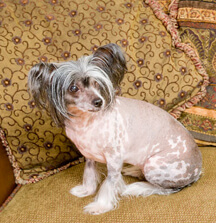An alternative exam can cover different things depending on your vet’s holistic specialties. In Dr. Frank’s practice an alternative exam is a Traditional Chinese Veterinary Medicine (TCVM) exam.
In honor of talking about Traditional Chinese Veterinary Medicine, today we have a photo Dr. Frank’s very sweet, soft and silky Chinese Crested dog, Punky.

Here is a little of what the American Kennel Club website says about Cresteds: “A fine-boned, elegant toy dog that craves human companionship, the Crested comes in two varieties. The Hairless has soft, silky hair on its head (crest), tail (plume) and feet (socks). Wherever the body is hairless the skin is soft and smooth. The Powderpuff is entirely covered with a double soft, straight coat. The two types often come from the same litter. Any color or combination of colors is allowed…
It is believed that Chinese mariners sailed with this breed… During the time of the Chinese plagues, hairless dogs were stowed aboard ships to hunt vermin. By the mid-nineteenth century, Cresteds began appearing in European art, and entries of the breed in American dog shows began in the late 1800s.”
In the photo, Punky is waiting for Dr. Frank on the couch in our reception area. On to Harmony’s alternative exam.
Topic: TCVM Exams
Dr. Frank: TCVM stands for Traditional Chinese Veterinary Medicine.
A Traditional Chinese Veterinary Medicine exam is very different from a conventional Western Medicine exam. The first thing you will notice is a TCVM exam is a much lengthier exam – approximately 1 hour. With this exam your vet will then determine if acupuncture and/or herbs are recommended.
In Traditional Chinese Veterinary Medicine the basis of an illness is diagnosed by means of understanding the individual pet’s constitution in addition to noting the outward symptoms. In a TCVM exam the vet will ask questions about your pet’s behavior and preferences such as whether your dog or cat is afraid of thunderstorms, wind or loud noises. Your vet will want to know things like if your pet likes children. Does he or she like to bathe in the sun? Does your pet prefer to sleep on hard surfaces? These are just an example of the types of questions your vet may ask during a TCVM exam.
Your answers will give the vet important information about underlying imbalances in your pet which can allow an illness to become symptomatic. Your vet will then correct your pet’s imbalances through Traditional Chinese Veterinary Medicine by the use of herbs, acupuncture and food.
